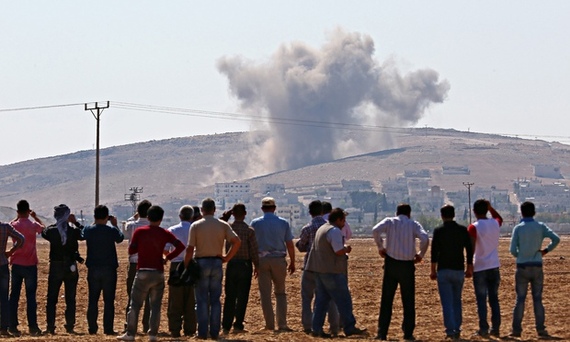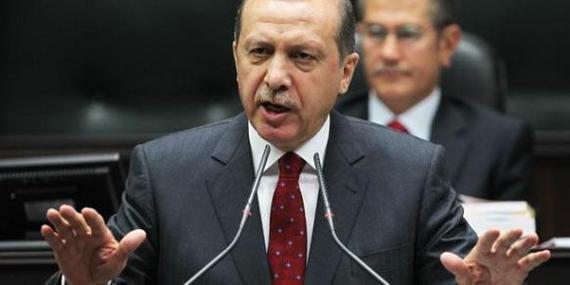The civilian Kurdish unrest, enveloping tens of Kurdish cities and town in Turkey, leaving 35 people dead and mass destruction of property behind, had the plight of small Syrian Kurdish enclave Kobani as the triggering element.
But the core of mass fury had to with the question Turkey's Kurds ask constantly these days: Can we trust that President Erdoğan is sincere about the peace talks with the PKK or, are we all being jerked around, duped?
Reports and interviews with the local Kurdish protesters have always come back to this crucial point.
Indeed, the four-week-long siege of the Kurdish town of Kobani of Syria at the Turkish border by the Islamic State of Iraq and the Levant (ISIL) militants exposed, how open Turkey is to the spillover effects of the regional crisis and how fragile and explosive its so-called "Kurdish Peace Process" is.
Turkey's equivocating stance vis a vis ISIL, which has cemented the international perception that it still is the weakest link in the coalition formed to combat its barbarous attacks, and its refusal to open a corridor to supply logistical support for the YPG fighters defending Kobani developed last week into a showdown spreading over 10 predominantly Kurdish provinces and Istanbul, leaving 35 people dead and massive destruction of property.
Turkey's refusal to take part, albeit indirectly, to save Kobani from falling, definitely was the spark. But according to the figures affiliated with the "Kurdish Political Movement" and the PKK, the triggering effect were President Recep Tayyip Erdoğan's policy choices on Turley's Kurdish issue in general.
One of them, Hatip Dicle, told my colleague Hasan Cemal, that what infuriated Turkey's Kurds en masse were several reasons.
As Kobani crisis erupted, Erdoğan said that "whatever ISIL is, so is the PKK," namely equating them. In the wording of the resolution passed by Turkish Parliament handing powers of intervention into Syria whenever needed, PKK was also mentioned along with ISIL.
Another "spark" for Kurds' fury was Erdoğan's phrase, which to Kurdish ears sounded like schadenfreude: "Look, Kobani is now about to fall!"
Also, Dicle pointed out, the refusal of Erdoğan's close circle to link Kobani with the peace process in Turkey led to the tipping point.
"If Kobani falls, so will the process" is a very common phrase these days in Turkey, repeated as the warning signal for even wider social unrest and, as many pundits point out, to a civil war.
The anxiety is built upon two elements: AKP's stance on Kobani did, as many expected, how deeply mistrustful Turkey's Kurds to Erdoğan have remained, and how their minor-scale uprising peppered with destruction helped surface the enmity to Kurds among other social segments of Turkish society.
For both, certainly, the main responsibility lies with what many Kurds see as "the delaying tactics" of Erdoğan as well as his densely secretive way of conducting the process; keeping society in general out of the loop of what its timing and aims are.
There are no signs for a change of mind in Ankara on the plight of Kobani. Turkish Prime Minister Ahmet Davutoğlu said on Wednesday that Turkey is absolutely not responsible for fighting in Kobani and that his country's borders are open for "humanitarian crossing," lashing out at those who he said wanted to portray Turkey as a "cause" or a part of the problem, and claiming that they themselves are part of "another agenda."
Davutoğlu pledged that the "open-border policy" won't be applied for Turkish citizens, a measure directed to prevent Turkey's Kurdish rebels, affiliated with the PKK, from crossing into Kobani.
From a vantage point, the severe challenges Turkey faces in ISIL crisis enveloping Syria and Iraq, can be understood. The official figures talk about 1.2 million Syrian refugees in Turkey. Lately, thousands of Yezidis sought shelter across the Iraqi border, and Kobani crisis led to approximately 200,000 mainly Kurds fleeing into neighboring Turkish provinces. This is an immense burden on the country, and it has already raised the social tensions within.
Erdoğan knows also the cost of unleashing Turkish boots on the Syrian ground, though he does not lower the decibels of his anti Assad rhetoric. Such a go-it-alone choice would bring Turkey to a confrontation with not only Assad's army, but also Syria's Kurds and perhaps even the Shia militia fighting ISIL.
Ankara has relevant arguments against the USA and the EU as well, for years of inaction against Damascus, and uses these as the basis for its own non-interventionism, unless the operations also target Assad.
Yet, falling short of meeting the minimum requirements as a NATO member, such as opening the bases for the missiles and aircraft, will certainly cause further rifts with its allies. Ankara certainly designs a pattern, based on delaying its decisions by hard negotiations with them, as long as possible, as its statements suggest.
The urgency, for Erdoğan, however, is with the domestic Kurdish dimension. What if Kobani falls? Will it mean an end to the peace process? There seems to be a general agreement in the assessments that it may bring Turkey closer to a civil war.
What is in Erdoğan's mind?
His utterly foxy policy drive so far has proven the cynics right.
Having chosen a spectator role for Turkey, and with a threatful rhetoric vis a vis the PKK, Erdoğan might be calculating that even if Kobani falls, the PKK can neither counter the will of Abdullah Öcalan, its jailed leader, nor can it enforce an end to the ceasefire, because the PKK may not have enough force to fight on two fronts.
In short, Erdoğan wants to see whether or not the PKK "command" in Iraq loses its prestige by the eventual fall of Kobani -- which it sees as its "liberated bastion" and, also, whether more frictions with Öcalan develop.
An AKP deputy, who spoke to BBC correspondent Paul Moss in Istanbul on condition of anonymity, said: "President Erdoğan is focused on increasing his votes, not to solve the Kurdish problem. I believe that the peace process may soon collapse and this would drive the country into chaos."
If Erdoğan is intent on gambling, he counts certainly on the anti-Kurdish sentiments on the domestic political front: Kurdish riots showed that large, nationalist segments of the society would again approve of hard security measures against the Kurds.
Erdoğan the pragmatist may be reasoning, that if repeated, such destructive unrest may pave the way for him to re-embrace the nationalist masses, and help keep him in the power.
Indeed, many Kurds also voice fears that the rolling of the military troops in the civilian areas of unrest along with the police may signal a new alliance between Erdoğan and the top command.
The recent legal package that envisages severe curbing of basic rights and freedoms mean that as he did before, Erdoğan successfully meets all the challenges -- regardless of its methods -- from the opposition, simply to boost his authoritarianism.
Some key figures of the PKK's military wing have recently been louder, questioning openly whether Erdoğan's real intention is to push for a new war, rather than work for peace.
"There is no president in Turkey at the moment," said Cemil Bayık, leader of the KCK, PKK's armed local network. "Erdoğan speaks like a party chairman. He sees himself still as the AKP's leader. He does not represent the people (of Turkey). Let alone representing the Kurds, he is conducting enmity towards them. Driven by a hegemonic mindset he acts as if he is superior to the other parties, and exposes his authoritarian personality. But when it comes to the Kurds, he tries to eradicate and nullify them."
"One can therefore neither expect ceasefire, nor peace under this mindset. As a matter fact there has never been a settlement process... While only giving lip service to peace process AKP tries to cover his unwillingness, pursuing a line instead to stall Turkish people and the Kurds off. Erdoğan's current fury stems from his realisation that he can no longer do this for neither of us."
What are, then, Kurds' options? Profound Kurdish mistrust for the peace process has to do with the perception that Erdoğan's strategy is to use the ongoing, fragile ceasefire as a leverage to consolidate one-man power, election after election.
Majority of the Kurds, the electoral base of the HDP, the political wing of the PKK, translate the process as the release of Öcalan, all its other aspects being secondary.
In a sense, cynics might argue, Öcalan is a "hostage" used to keep the Kurdish masses in control; helping Erdoğan to drag his feet until he secures absolute power.
The recent 'road map' presented to the HDP by the government, rather vague in content, sets a deadline for disarmament for February next year, and mentions only partial, not general, amnesty.
The next elections in Turkey is set for June, but there are already rumors in Ankara of early elections in March or April.
This adds to the Kurdish suspicions of "being played."
If this strategy proves to be true, it will have consequences.
The AKP is in a difficult position, but, realistically, so is the PKK.
And as ever before, Turkey still stands between reviving its democratization or a drifting further towards instability and nationalism-branded authoritarian rule.


